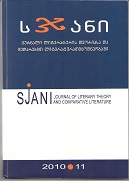რენესანსი: კონტექსტი
Renaissance: Context
Author(s): Gaga LomidzeSubject(s): Literary Texts
Published by: ლიტერატურის ინსტიტუტის გამომცემლობა
Keywords: Renaissance; Ancient Times; Middle Age; humanis; Boccaccio; Rustaveli; knowledge; faith; episteme; Dante; individualism
Summary/Abstract: Renaissance self-consciously adopted the ideas of ancient Greece and Rome, especially that of Plato and Cicero. They started to discover the beauty of form and they found Plato. At the Platonic Academy in Florence Marcilio Ficino was trying to reconcile the ideas of Plato and Moses, Socrates and Christ. Italian humanists were enchanted by the idea of combination of Christian and Pagan as well as flesh and soul, immanent and transcendent – as seen in Raphael’s “School of Athens”, where one can easily trace the effort to reconcile oppositions. This revival of interest in ancient Greece and Rome was significantly facilitated by invention of printing. Suddenly it became possible to circulate books throughout the Europe. Early historians described a clear intellectual break with the medieval era (Burckhadrt, etc). Though recent researches proved that in fact Renaissance grew in the framework of the previous medieval era and the changes Europe experienced were more an evolution than a revolution.
Journal: სჯანი
- Issue Year: 2014
- Issue No: 15
- Page Range: 12-20
- Page Count: 9
- Language: Georgian

